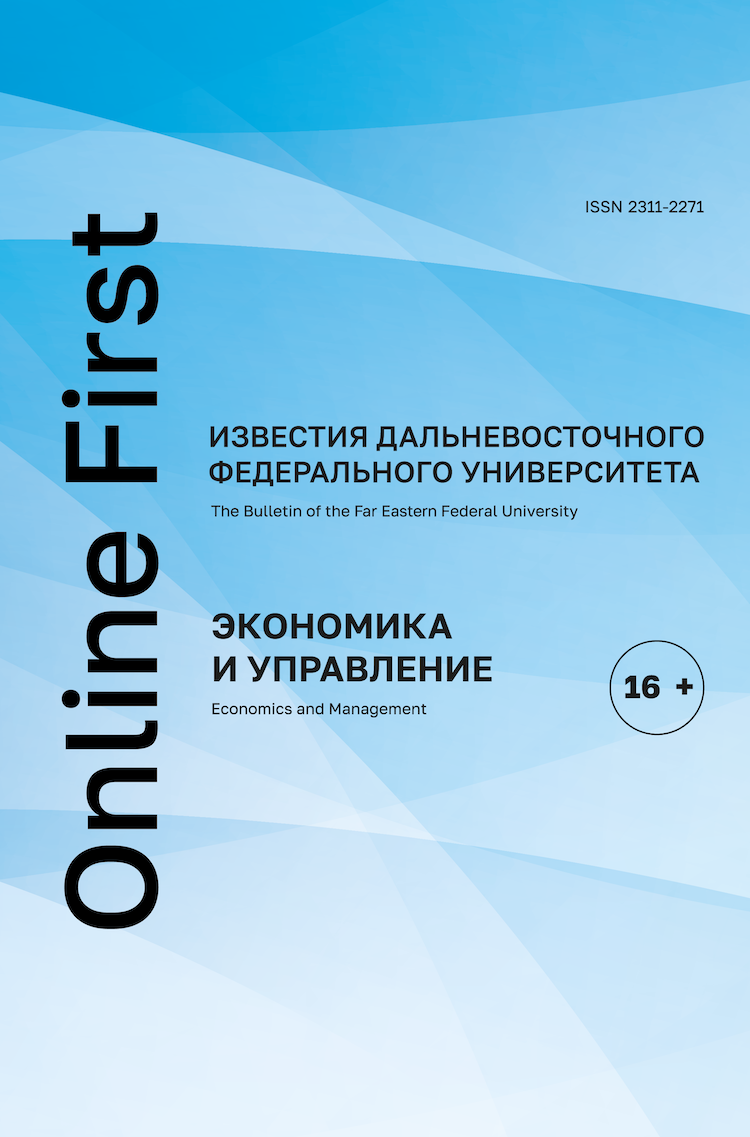Влияние человеческого капитала на результативность новых предпринимательских команд: обзор эмпирических исследований
Аннотация
Ключевые слова
Полный текст:
PDFЛитература
Carland J.A.C., Carland Jr J.W. A model of shared entrepreneurial leadership. Acade-my of Entrepreneurship Journal, 2012, vol. 18, no. 2, pp. 71-82.
Hill L.A. et al. Collective genius: The art and practice of leading innovation. Harvard Business Review Press, 2014.
Cooper A.C., Woo C.Y., Dunkelberg W.C. Entrepreneurship and the initial size of firms. Journal of Business Venturing, 1989, vol. 4, vol. 5, pp. 317-332.
Kamm J.B. et al. Entrepreneurial teams in new venture creation: A research agenda. Entrepreneurship theory and practice, 1990, vol. 14, no. 4, pp. 7-17.
Klotz A.C. et al. New venture teams: A review of the literature and roadmap for future research. Journal of management, 2014, vol. 40, no. 1, pp. 226-255.
Reynolds P.D., White S.B. The entrepreneurial process: Economic growth, men, women, and minorities. Praeger Pub Text, 1997.
West III G.P. Collective cognition: When entrepreneurial teams, not individuals, make decisions. Entrepreneurship Theory and Practice, 2007, vol. 31, no. 1, pp. 77-102.
Timmons J.A. New venture creation: Entrepreneurship in the 1990s. Irwin Profession-al Publishing, 1990.
Dimov D., De Clercq D. Venture capital investment strategy and portfolio failure rate: A longitudinal study. Entrepreneurship Theory and Practice, 2006, vol. 30, no. 2, pp. 207-223.
Gorman M., Sahlman W.A. What do venture capitalists do? Journal of business ven-turing, 1989, vol. 4, no. 4, pp. 231-248.
Kaplan S.N., Strömberg P.E.R. Characteristics, contracts, and actions: Evidence from venture capitalist analyses. The Journal of Finance, 2004, vol. 59, no. 5, pp. 2177-2210.
Unger J.M. et al. Human capital and entrepreneurial success: A meta-analytical review. Journal of business venturing, 2011, vol. 26, no. 3, pp. 341-358.
Covin J.G., Slevin D.P. New venture strategic posture, structure, and performance: An industry life cycle analysis. Journal of business venturing, 1990, vol. 5, no. 2, pp. 123-135.
Reynolds P., Miller B. New firm gestation: Conception, birth, and implications for research. Journal of business venturing, 1992, vol. 7, no. 5, pp. 405-417.
Brush C., International Entrepreneurship: The Effect of Firm Age on Motives for Internationalization. Garland Publishing, London, 1995.
Schultz T.W. Investment in human capital. The American economic review, 1961, vol. 51, no. 1, pp. 1-17.
Psacharopoulos G., Woodhall M. Education for Development: An Analysis of In-vestment Choices (Washington, DC: World Bank), 1985.
Fitz-Enz J. The ROI of human capital: Measuring the economic value of employee performance. AMACOM Div American Mgmt Assn, 2000.
Unger J.M. et al. Human capital and entrepreneurial success: A meta-analytical review. Journal of business venturing, 2011, vol. 26, no. 3, pp. 341-358.
Colombo M.G., Grilli L. Founders’ human capital and the growth of new technology-based firms: A competence-based view. Research policy, 2005, vol. 34, no. 6, pp. 795-816.
Colombo M.G., Grilli L. Funding gaps? Access to bank loans by high-tech start-ups. Small Business Economics, 2007, vol. 29, no. 1-2, pp. 25-46.
Cooper A.C., Bruno A.V. Success among high-technology firms. Business horizons, 1977, vol. 20, no. 2, pp. 16-22.
Shrader R., Siegel D.S. Assessing the relationship between human capital and firm performance: Evidence from technology–based new ventures. Entrepreneurship theory and Practice, 2007, vol. 31, no. 6, pp. 893-908.
Shu C., Simmons S.A. Firm survival in traded industries: does localization moderate the effects of founding team experience? Small Business Economics, 2018, vol. 50, no. 3, pp. 643-655.
Ganotakis P. Founders’ human capital and the performance of UK new technology-based firms. Small Business Economics, 2012, vol. 39, no. 2, pp. 495-515.
Huynh T. et. al. University spin-off's performance: Capabilities and networks of founding teams at creation phase. Journal of Business Research, 2017, vol. 78, pp. 10-22.
Patzelt H. CEO human capital, top management teams, and the acquisition of venture capital in new technology ventures: An empirical analysis. Journal of Engineering and Technology Management, 2010, vol. 27, no. 3-4, pp. 131-147.
Protogerou A., Caloghirou Y., Vonortas N.S. Determinants of young firms’ innovative performance: Empirical evidence from Europe. Research Policy, 2017, vol. 46, no. 7, pp. 1312-1326.
McGee J.E., Dowling M.J., Megginson W.L. Cooperative strategy and new venture performance: The role of business strategy and management experience. Strategic management journal, 1995, vol. 16, no. 7, pp. 565-580.
Brinckmann J., Hoegl M. Effects of initial teamwork capability and initial relational capability on the development of new technology‐based firms. Strategic Entrepreneurship Journal, 2011, vol. 5, no. 1, pp. 37-57.
Zhao Y.L., Song M., Storm G.L. Founding team capabilities and new venture performance: The mediating role of strategic positional advantages. Entrepreneurship Theory and Practice, 2013, vol. 37, no. 4, pp. 789-814.
De Cleyn S.H., Braet J., Klofsten M. How human capital interacts with the early de-velopment of academic spin-offs. International Entrepreneurship and Management Journal, 2015, vol. 11, no. 3, pp. 599-621.
Dahl M. S., Reichstein T. Are you experienced? Prior experience and the survival of new organizations. Industry and Innovation, 2007, vol. 14, no. 5, pp. 497-511.
(c) 2020 Научный журнал "Известия Дальневосточного федерального университета. Экономика и управление"
© Дальневосточный федеральный университет, 1996-2022.
© Научный журнал "Известия Дальневосточного федерального университета Экономика и управление" - 16+.
Свидетельство о регистрации средства массовой информации ПИ № ФС77-57575
Издатель - ФГАОУ ВО "Дальневосточный федеральный университет".
При перепечатке ссылка на Сайт Журнала обязательна.
Коммерческое использование размещенных материалов запрещено.
E-mail: sem-journal@dvfu.ru





